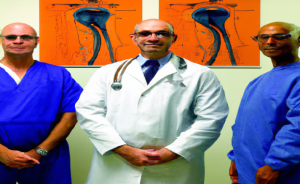Understanding Men’s Health Basics
Men’s health includes a broad spectrum of particular medical and health issues. It is important to understand that while many health disorders are exclusive to or more common in males, other illnesses affect both men and women. For example, disorders like benign prostatic hyperplasia (BPH) and prostate cancer, which mostly affect males, raise serious concerns about prostate health. Prostate screenings are recommended by the American Urological Association, particularly for males over 50 or those who have a family history of prostate problems.
Another crucial topic is cardiovascular health, as heart disease is the primary cause of mortality for males worldwide in many regions. Regular exercise, a balanced diet, and periodic check-ups to monitor cholesterol and blood pressure are advised by the American Heart Association. These precautionary steps are essential for early risk identification and mitigation.
Men’s health maintenance greatly depends on routine medical exams. Treatment results can be greatly enhanced by early diagnosis of illnesses including diabetes, hypertension, and several types of cancer. The likelihood of developing several health problems rises with age, making these examinations increasingly crucial. Men should get screened for health issues annually, according to the Centers for Disease Control and Prevention (CDC). This can help identify possible issues early on and manage them more effectively. Men can live longer, healthier lives if they are proactive and well-informed about health issues.
- Expert urologists consulting in a modern clinic, utilizing the latest medical advancements to offer personalized care. Their dedication to men’s health is evident in their focused discussions and patient-centric approach.
- Advanced urological care in action, showcasing a team of skilled professionals using state-of-the-art equipment to diagnose and treat complex conditions, ensuring every patient receives the best possible care.
- Innovative urology: Blending cutting-edge technology with unparalleled expertise. Here, specialists are seen leveraging the latest medical advancements to revolutionize patient treatment and care.
- Dedicated urologists at work in a clinical setting, displaying their commitment to providing top-tier urological health services, with patient well-being as their top priority.
- The face of modern urology: An expert care team, united in their mission to advance men’s health through evidence-based practices and compassionate care.
- victoria urologists
Men’s health must prioritize particular urological health issues in addition to general health concerns. For individualized guidance and care in these areas, consulting with a urologist Victoria is recommended. These medical practitioners are skilled in treating diseases specific to males, including kidney stones, urine incontinence, and erectile dysfunction. Their expertise is essential for providing the most recent therapies and preventive measures, as well as for early identification and management.
For instance, erectile dysfunction (ED) is a prevalent worry among men and may be a sign of more serious conditions like diabetes or cardiovascular disease. To receive appropriate therapy, men and their urologists must have an open discussion about such things. Victoria’s urologists are skilled in treating men’s health holistically, which includes not only treating symptoms but also looking into possible reasons.
Furthermore, urinary health—which is frequently disregarded—is essential to general well-being. Even though they are less common in males, conditions like urinary tract infections need to be treated right once when they do. The advice of these skilled medical professionals in Victoria aids in the efficient management of these illnesses, averting complications and advancing general urinary tract wellness.
- Advanced urological care in action, showcasing a team of skilled professionals using state-of-the-art equipment to diagnose and treat complex conditions, ensuring every patient receives the best possible care.
- Compassionate care by professional urologists, captured in a moment of thoughtful patient consultation. This image reflects the empathy and understanding that forms the core of our clinical practice.
- Cutting-edge urology: Where science meets health. This photo depicts urologists engaged in groundbreaking research and application, pushing the boundaries of medical science for better patient care.
- Expert urologists consulting in a modern clinic, utilizing the latest medical advancements to offer personalized care. Their dedication to men’s health is evident in their focused discussions and patient-centric approach.
- Women’s Urological Health
- Advanced urological care in action, showcasing a team of skilled professionals using state-of-the-art equipment to diagnose and treat complex conditions, ensuring every patient receives the best possible care.
Nutritional Needs for Men’s Health
Maintaining excellent health starts with eating a nutritious, well-balanced diet, and this is especially true for men. Men must modify their dietary intake according to their life phases to maintain body functioning and avoid health problems. For example, minerals like zinc and magnesium are essential for preserving testosterone levels and prostate function, two major aspects of men’s health. Nuts, seeds, and leafy greens are among the foods high in these minerals that a guy should eat daily.
Protein is essential for strong muscles and general physical fitness, which is especially important for men as they age. Lean meats, seafood, lentils, and dairy products are excellent sources of protein that not only help maintain muscle mass but also improve metabolic health and weight control. It’s critical to counterbalance them with a range of fruits and vegetables, as they offer vital antioxidants and vitamins. These nutrients aid in the fight against inflammation and oxidative stress, two conditions that can result in chronic illnesses.

Urology Patient Outcomes
Omega-3 fatty acids, which are well-known for their heart health advantages, are another essential part of a man’s diet. Omega-3-rich foods such as salmon, mackerel, and flaxseeds help lower the risk of heart disease, which is the world’s biggest health problem for men. Consuming enough fiber from fruits, vegetables, and whole grains is also essential for maintaining digestive health and avoiding diseases like colorectal cancer, which is more common in males.
Including these food components promotes general health and lifespan in addition to helping with certain men’s health concerns. Men may be sure that their bodies are getting all the vitamins and minerals they require by following a diet high in a variety of nutrient-dense foods. Even though each person’s nutritional requirements are unique, following these broad recommendations can assist men in making dietary decisions that will improve their health.
- Pioneering urological treatments and solutions being discussed by top medical professionals, demonstrating their commitment to innovation and excellence in patient care.
- Behind the scenes: Urologists preparing for surgery, exemplifying the meticulous planning and precision that goes into every procedure to ensure patient safety and success.
Preventing Common Urological Issues
Men’s general health depends heavily on their urological health, therefore it’s important to know how to avoid frequent problems. Numerous urological conditions can have a major negative influence on quality of life, including prostatitis, BPH, and UTIs. Awareness of risk factors and lifestyle choices are the first steps toward prevention. Victoria urologists can offer specialized guidance and preventive measures designed to address these issues.
Lifestyle changes can have a big impact on the management and prevention of BPH, a disorder marked by the enlargement of the prostate gland. It’s crucial to maintain a healthy weight and engage in regular physical activity. A balanced diet and regular exercise are recommended since obesity has been associated with an increased risk of developing BPH. Furthermore, cutting back on alcohol and caffeine, which irritate the bladder, may aid in the management of symptoms.

Urology Patient Care
By drinking enough water, maintaining healthy urination practices, and getting regular prostate examinations, one may frequently avoid prostatitis or inflammation of the prostate gland. Drinking enough water lowers the risk of urinary tract infections by removing germs. To prevent bacterial infections, men should also refrain from retaining pee for extended periods and maintain proper cleanliness. A urologist or penis doctor can offer more individualized advice and treatment choices for particular penis-related ailments.
Urological health is significantly influenced by diet as well. Prostate health can be supported by foods high in antioxidants and anti-inflammatory qualities, such as berries, green tea, and tomatoes (which are high in lycopene). Flaxseeds and fish, which are high in omega-3 fatty acids, are known to lower inflammation, which may help with illnesses like prostatitis.

Urology Education
Finally, men must get regular physical examinations, which should include prostate testing. More successful treatment might result from the early discovery of any anomalies. Urological health difficulties must be prevented and managed with regular appointments with healthcare experts, particularly for men over 50 or those with a family history of prostate problems.
Read also: EXPERT UROLOGISTS: SPECIALIZING IN ADVANCED TREATMENT OF UROLOGICAL DISEASES
- A day in the life of a urology clinic, capturing the hustle and bustle of healthcare professionals dedicated to improving the lives of their patients.
- Urology with a personal touch: Patient consultations. This image shows the warm, patient-centered environment where individual needs and concerns are addressed with care and professionalism.
- Urology professionals committed to excellence, as seen in this candid shot of them reviewing patient data to make informed decisions for effective treatment.
- Our surgeons practice
- Advancing men’s health with expert urology, where each patient’s journey is met with advanced medical care, compassionate support, and a commitment to improving quality of life.
- “Urology specialists engaged in deep discussion about patient care, highlighting their commitment to continuous learning and collaboration in the pursuit of better health outcomes for men.
- Expert urologists consulting in a modern clinic, utilizing the latest medical advancements to offer personalized care. Their dedication to men’s health is evident in their focused discussions and patient-centric approach.
- “Urology specialists engaged in deep discussion about patient care, highlighting their commitment to continuous learning and collaboration in the pursuit of better health outcomes for men.
- A dynamic urology team strategizing for optimal patient outcomes. Their collective expertise in men’s health issues forms a strong foundation for effective treatment planning.
- Urologists collaborating for better men’s health. This scene captures the essence of teamwork in medical practice, combining diverse expertise for comprehensive patient care.
- Empathetic urology care in a comforting environment. The image shows a patient being reassured and supported, emphasizing the clinic’s focus on holistic care.
- Focused urology experts in a clinical conference, deeply engaged in exchanging knowledge and insights to stay at the forefront of urological medicine.
Exercise and Men’s Well-being
Men’s health is largely dependent on exercise, which has several advantages that go well beyond just improving physical fitness. Maintaining cardiovascular health, lowering the risk of chronic illnesses, and enhancing mental health all depend on regular physical exercise. A geriatric urologist can offer specific workout advice for older men who take their age-related urological health into account.
Heart health necessitates cardiovascular workouts such as swimming, cycling, or running. Adults should engage in moderate-intensity aerobic activity for at least 150 minutes a week, according to the American Heart Association. For individuals looking for guidance from a male urologist near me on how to enhance general health and avoid urological problems, this is very helpful. Frequent cardiovascular exercise benefits mood, energy, and prostate and urinary health. It also helps with weight control.

Urology Lifestyle Advice
Strength training holds similar significance, especially for men as they age. Muscle mass normally decreases with age, but it may be built and maintained with its assistance. In addition to improving bone health, this kind of activity lowers the chance of injury. Men who are worried about their reproductive health may find that part of a larger strategy to improve fertility includes participating in suitable physical activities under the supervision of a male fertility urologist near me.
Exercises for balance and flexibility are essential for general health yet are frequently disregarded. Exercises like yoga and tai chi not only help with balance and flexibility but also have positive effects on mental health. They can boost awareness, help reduce stress, and improve the quality of sleep. Including these exercises in a weekly schedule can offer a comprehensive approach to fitness and health, enhancing the recommendations and care strategies from specialists in urological health.
Read also: Geriatric Urology

Urology Professional Development


























